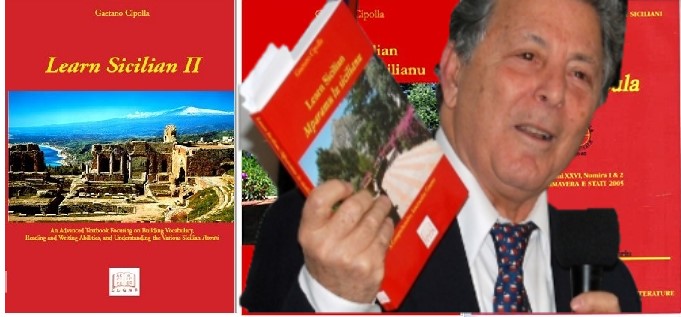By Antonio Pagano
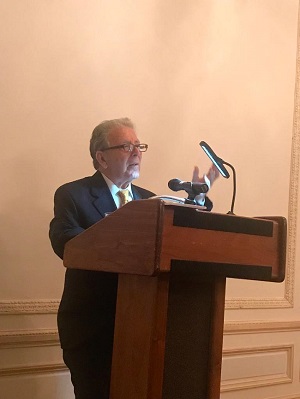
Professor Gaetano Cipolla presented his new book, Learn Sicilian II, just published by Legas, at the Columbus Citizens Foundation in Manhattan on November 30, 2021. The event, which was open to the members of the Foundation and to the public, was attended by Arba Sicula members from the tri-state area and by lovers of Sicilian culture. One person came down from Rochester, New York, to hear the presentation. The lecture room in the elegant townhouse on East 69th Street, just off Fifth Ave, was filled to capacity, even though there was a charge of $35.00 to attend the presentation. But in exchange, everyone was treated to a cocktail party with delicious hors d’oeuvres, drinks and conversation, and a copy of the impressive book that Professor Cipolla autographed after the lecture.
After a brief introduction by Lisa Ackerman, Professor Cipolla thanked Joe Scelsa, who was instrumental in organizing the presentation, and the people who braved the dangers of COVID. Then he began to speak passionately about his work as President of Arba Sicula, a non-profit organization based at St. John’s University that promotes the language and culture of Sicily. He described the bilingual journal Arba Sicula, which is unique in that it is written in Sicilian and in English, and Sicilia Parra, the newsletter of the organization. Professor Cipolla pointed out that Sicilian is not a corruption of Italian as some people think; in fact, he said that Sicilian was the first Italic language to be used for poetry. He stated that the Sicilian School that flourished under Emperor Frederick II in the first half of the thirteen century, created the Italian literary canon. Quoting Dante Alighieri who stated that for the first 150 years “whatever poetry was written in Italy was called Sicilian.”
Prof. Cipolla added that if Dante can rightly be given credit as the father of the Italian language, Sicily can rightfully claim the title of mother.
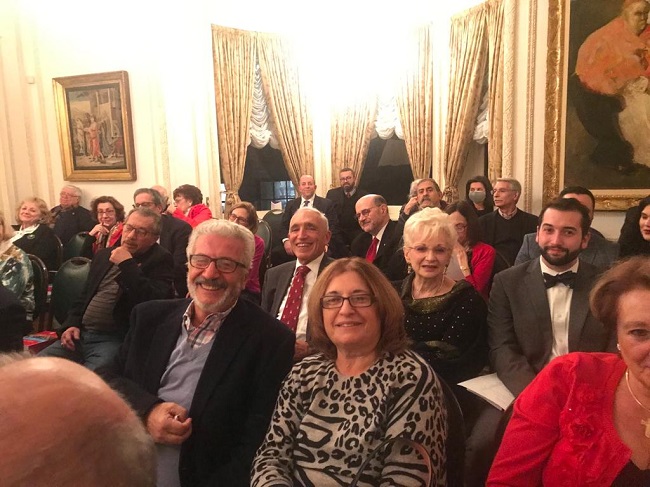 Turning to the topic of his presentation, Prof. Cipolla spoke about the great interest that exists for the Sicilian language among Sicilian-Americans who are interested in discovering their roots. He mentioned how his first textbook, Sicilian Learn Sicilian/Mparamu lu sicilianu, is already in its third reprint and was used as a textbook at the University of Pennsylvania (Philadelphia) and even at the Université de la Manouba in Tunis, as well as at Italian Charities of America in Queens, New York. The success of the grammar and the fact that a language is not learned in one year, convinced Prof. Cipolla to create a more advanced textbook to fill the gaps, to cover the complexities of the language in greater depth, and to provide more tools to the students so they can understand how the language works.
Turning to the topic of his presentation, Prof. Cipolla spoke about the great interest that exists for the Sicilian language among Sicilian-Americans who are interested in discovering their roots. He mentioned how his first textbook, Sicilian Learn Sicilian/Mparamu lu sicilianu, is already in its third reprint and was used as a textbook at the University of Pennsylvania (Philadelphia) and even at the Université de la Manouba in Tunis, as well as at Italian Charities of America in Queens, New York. The success of the grammar and the fact that a language is not learned in one year, convinced Prof. Cipolla to create a more advanced textbook to fill the gaps, to cover the complexities of the language in greater depth, and to provide more tools to the students so they can understand how the language works.
Dr. Cipolla often departed from his prepared remarks to offer insights and to relate humorous asides that the audiences visibly enjoyed. Indeed, his presentation was hardly what one would expect from someone who is talking about a grammar textbook. But that is precisely what this book is not. This was a brief but enlightening excursion into the Sicilian culture.
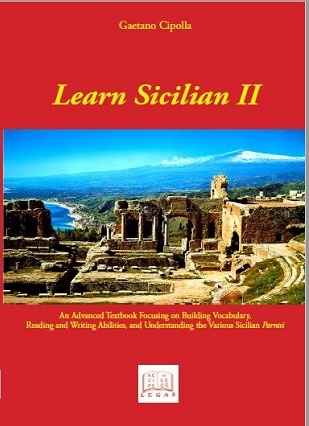 Quoting Cicero, who described Sicilians as “an intelligent but suspicious race of people who have a wonderful ability to inject humor into even the most difficult situations,” Prof. Cipolla shared a few humorous anecdotes. While Americans think of Sicilians as sullen and humorless individuals, at least that is how the media portrays them, prof Cipolla showed that Cicero was right in his assessment. Each of the 18 chapters in the book ends with a story that confirms that Sicilians indeed have a keen sense of humor.
Quoting Cicero, who described Sicilians as “an intelligent but suspicious race of people who have a wonderful ability to inject humor into even the most difficult situations,” Prof. Cipolla shared a few humorous anecdotes. While Americans think of Sicilians as sullen and humorless individuals, at least that is how the media portrays them, prof Cipolla showed that Cicero was right in his assessment. Each of the 18 chapters in the book ends with a story that confirms that Sicilians indeed have a keen sense of humor.
But Dr. Cipolla managed to be scholarly even as he was telling amusing stories. To understand and appreciate the punchline of his next story, he had to explain one of the features of the dialect of Ragusa, while at the same time explaining an important feature of this textbook. If you have traveled to Sicily, you may have noticed that the Sicilian spoken in the various cities is somewhat different. The same word can be pronounced one way in Catania and another in Palermo. In spoken Sicilian, linguists have identified ten major varieties that can be heard traveling through the island. This textbook addresses in greater depth what linguists call variazioni diatopiche, that is, the differences that exist in the spoken language.
The written language, however, generally remains uniform throughout the island. The book describes not only the major varieties but also provides readings that are written in the local dialect. The readings are also accompanied by recordings usually made by the authors themselves. Prof. Cipolla explained that his aim was not to teach students the local dialects but to enable them to identify them and realize that basically once you learn a few rules, the differences become transparent. Learn Sicilian II is the only textbook that provides samples of the various parrati and detailed explanations of how they work within the context of Sicilian.
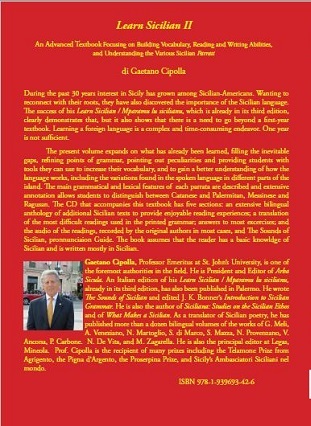 One of the features of the language of Ragusa and surrounding cities is that speakers assimilated the Latin words beginning with CL such as Clave (key) and PL as Plumbu (lead) which are normally pronounced chiavi and chiummu in most of the island. In Ragusa, however, they will pronounce these two words ciavi and ciummu (that is, pronounced as the English words chat or chew). Now the anecdote was told by the superintendent of public schools in Ragusa who had gone to inspect a class in a small town, accompanied by various important educators in his district. The teacher, seeing so many important people in her class, wanted to tell her students how important they all were and began listing their jobs and their responsibilities and she was so hyperbolic in her description of their importance that one fifth-grader could not restrain himself and with mouth agape and wide-open eyes, blurted out a word one normally does not use in public, especially in front of the Superintendent. The word was the equivalent of WOW! But Sicilians in such cases use the word for the male organ, (minchia), but the youngster pronounced it according to the rule explained above.
One of the features of the language of Ragusa and surrounding cities is that speakers assimilated the Latin words beginning with CL such as Clave (key) and PL as Plumbu (lead) which are normally pronounced chiavi and chiummu in most of the island. In Ragusa, however, they will pronounce these two words ciavi and ciummu (that is, pronounced as the English words chat or chew). Now the anecdote was told by the superintendent of public schools in Ragusa who had gone to inspect a class in a small town, accompanied by various important educators in his district. The teacher, seeing so many important people in her class, wanted to tell her students how important they all were and began listing their jobs and their responsibilities and she was so hyperbolic in her description of their importance that one fifth-grader could not restrain himself and with mouth agape and wide-open eyes, blurted out a word one normally does not use in public, especially in front of the Superintendent. The word was the equivalent of WOW! But Sicilians in such cases use the word for the male organ, (minchia), but the youngster pronounced it according to the rule explained above.
Professor Cipolla addressed different aspects of Sicilian culture, providing profiles of famous Sicilian writers, scientists, and artists; describing towns, myths and many other topics. He spoke of the Sicilians’ ability to communicate without words. He demonstrated how to say no in Sicilian by lifting his head slightly and making a tz sound against his teeth and tested the audience to see if they understood a few hand gestures. The lecture concluded with what he called a test of Sicelitude, which consisted of thirty proverbs from which a word or two were left out. Prof. Cipolla explained that knowing how to complete the proverbs shows how well a student absorbed Sicilian culture. He said that no middle-aged person who lives in Sicily would have any problem passing the test. While there were relatively few people in the audience who were fluent in Sicilian, there were some who had the right response immediately on hearing the incomplete proverb. Prof. Cipolla introduced the test, explaining that if you wanted to tell a person that he is utterly worthless you tell him “Tu sì nuddu mmiscatu cu….”. Someone immediately yelled out nenti, the right completion: “You are no one mixed with…nothing!” While there were a few people who knew how to complete the proverbs, one person was particularly good and immediately yelled out all the answers. He was clearly fluent in Sicilian and proved the point.
This presentation was informative, educational, and very funny. Clearly the mark of a good teacher who knows how to combine weighty matters with a light touch.


